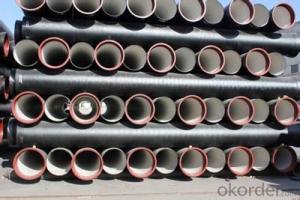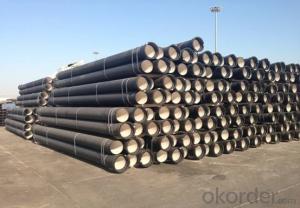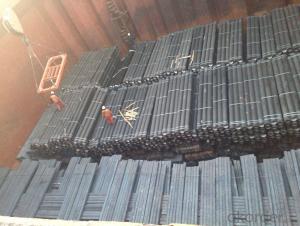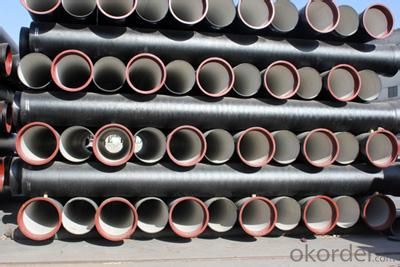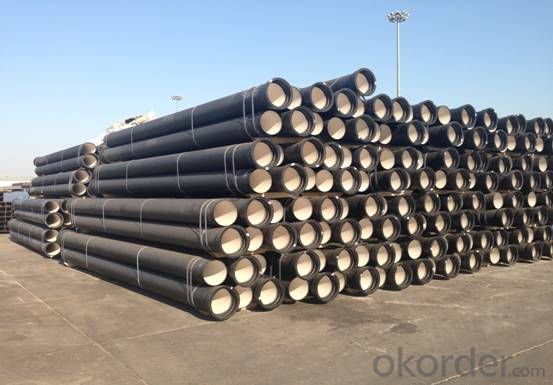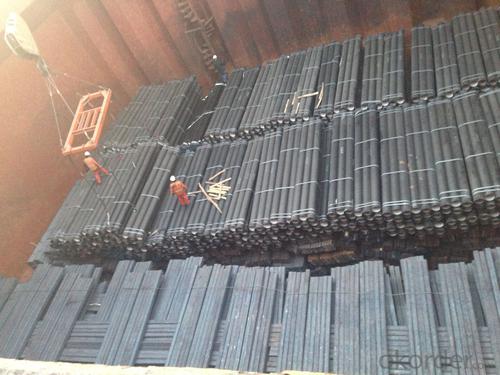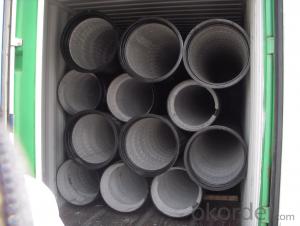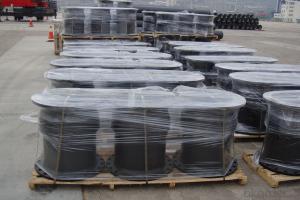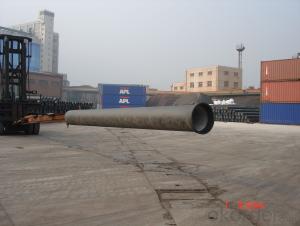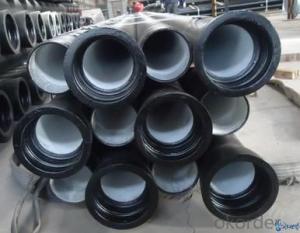DUCTILE IRON PIPE C Class DN800
- Loading Port:
- China Main Port
- Payment Terms:
- TT OR LC
- Min Order Qty:
- -
- Supply Capability:
- -
OKorder Service Pledge
OKorder Financial Service
You Might Also Like
Ductile Iron Cast Pipe is without any defects compare with tradition casting tech, which has many advantages particularly as follow:
(1) High density. In the "vertical upward casting" process, the melt iron of centre liquid column in center crystallizer is continuously feeding for volume shrinkage caused by condensation tube at outer circumference , which lead to be free of shrinkage porosity.
(2) High purity. When melt iron pouring, the mixed impurities such as gas, dross, sand grain which are lighter than melt iron could be eliminated at furnace mouth, its impossible to enter into the crystallizer through the channel, so the melt iron into the crystallizer is very pure.
(3) Strength with toughness. The cooling speed provided by continuous crystallizer is 30 times than sand casting and 5 times than centrifugal casting, and doesn't produce white iron, the eutectic cell volume of continuous cast iron is one eighth to one tenth compare with traditional cast iron. The density of graphite nodule in ductile iron can reach 300-700 pcs/mm2. Therefore, all reason above improve the strength and toughness of continuous cast iron.
(4) Free machining. The high speed cooling make the hardening phase (such as boride, steadite) not appear like reticular, massive or thick, but diffuse like fish bone and pane in shape, moreover, there are tiny graphite flakes inlaid hardening phase. It's free machining in BrinellHardness the range of 250-300HB. However, the Brinell Hardness of 250 is top limit to common metal materials.
(5) Uniform composition of tube wall. The convection mixing of liquid column caused by marching type drawing in crystallizer make the composition of tube wall well-distributed, and concentration gradient very little.
(6) High productivity. To the wall thickness of tube under 10mm, the speed of continuous casting is 1 meter/min, to the wall thickness of tube under 20mm, the speed of continuous casting is 0.5 meter/min, which is high efficiency that centrifugal or other casting tech couldn't reach.
- Q: How does ductile iron pipe perform in areas with high traffic loads?
- Areas with high traffic loads greatly benefit from the exceptional performance of ductile iron pipe. Its superior strength and durability enable it to effectively handle heavy loads and withstand the impact caused by vehicular traffic. Ductile iron pipes possess a high resistance to bending and cracking, making them an ideal choice for applications in roadways, highways, and other areas with high traffic. The ability of ductile iron pipe to distribute weight and pressure exerted by heavy traffic loads is a result of its high strength. This reduces the risk of deformation or failure, making it a reliable option for transporting water, sewage, and other fluids in areas commonly frequented by heavy vehicles. Moreover, ductile iron pipe displays excellent corrosion resistance, further enhancing its performance in high traffic areas. It can withstand exposure to various environmental conditions, such as moisture, chemicals, and abrasion, without compromising its structural integrity. This durability translates into minimal maintenance requirements and a long service life, making it a cost-effective solution. In addition, the smooth internal surface of ductile iron pipe minimizes friction and allows for efficient flow of liquids. This reduces energy consumption and maximizes the hydraulic capacity of the pipe, which is particularly advantageous in areas with high traffic loads where the demand for water or wastewater transportation is often high. To summarize, ductile iron pipe is a reliable and durable choice for areas with high traffic loads. Its strength, resistance to bending and cracking, corrosion resistance, and efficient flow characteristics make it an excellent option for transportation systems in roadways, highways, and other heavily trafficked areas.
- Q: How does ductile iron pipe perform in areas with high soil erosion?
- Ductile iron pipe is renowned for its remarkable strength and durability, rendering it a dependable option for regions experiencing extensive soil erosion. With its distinctive composition, including graphite nodules, it possesses the capacity to be both pliable and resistant to fractures or cracks, even in demanding environments. Consequently, ductile iron pipe is highly capable of enduring the impact of soil erosion. In regions with high soil erosion, the surface of the pipe can potentially be scraped by soil particles, leading to abrasions or damage. However, ductile iron pipe's substantial wall thickness and corrosion-resistant coating effectively serve as a barrier against these abrasive forces. Consequently, even in regions with considerable soil erosion, ductile iron pipe can maintain its structural integrity and functionality. Additionally, the ability of ductile iron pipe to resist corrosion further augments its performance in areas with high soil erosion. Soil erosion frequently results in increased moisture content, which can expedite the corrosion process for certain materials. Nonetheless, ductile iron pipe's protective coating, typically composed of zinc or epoxy, acts as a shield against corrosion, ensuring prolonged performance and reliability. To summarize, ductile iron pipe exhibits exceptional performance in regions with high soil erosion due to its strength, flexibility, and resistance to fractures or cracks. Its substantial wall thickness and corrosion-resistant coating make it highly durable against abrasive forces and corrosion, enabling it to withstand the challenges posed by soil erosion. Consequently, ductile iron pipe is a dependable choice for infrastructure projects in these areas, offering long-lasting and efficient water and wastewater transportation systems.
- Q: Is ductile iron pipe breakable?
- 5, inferior wood surface is easy to produce cracks, because its billet is adobe, Adobe porous, Adobe in the process of cooling due to the role of thermal stress, cracks, after rolling, there are cracks;6, poor drainage tube appearance often pitted phenomenon. Pits is due to groove wear caused by defects in pipe surface irregular uneven. Because of the poor sewer pipe manufacturers to pursue profits, often rolling groove rolling most standard.Ductile iron pipes are broken because of the excessive heat treatment during casting or the lack of proper addition in casting to prevent a change in the proper brittleness and to cause cracking. It is recommended that you used to repair defects of cast iron machine, are currently on the market to sell, but also can ensure welding intact appearance, make your products by quality, but if it is in the use of performance can not meet the effect, especially the pipeline pressure quite big, what methods are of no use that must be re cast as the new.
- Q: Are ductile iron pipes suitable for use in hydroelectric dams?
- Yes, ductile iron pipes are suitable for use in hydroelectric dams. Ductile iron is a type of iron that has a higher degree of flexibility and strength compared to traditional cast iron. This makes it an ideal choice for many applications, including water transmission systems in hydroelectric dams. Ductile iron pipes are known for their durability and resistance to corrosion, which is crucial in a dam environment where water exposure is constant. They can withstand high pressures and extreme temperatures, making them suitable for the demanding conditions found within hydroelectric dams. Additionally, ductile iron pipes have excellent joint integrity, ensuring that they remain leak-proof and reliable over their lifespan. This is important for maintaining the efficiency and effectiveness of a hydroelectric dam's water transmission system. Furthermore, ductile iron pipes are cost-effective compared to other materials, such as steel or concrete. They have a long service life, require minimal maintenance, and are readily available, making them a practical choice for hydroelectric dam projects. In conclusion, ductile iron pipes are a suitable choice for use in hydroelectric dams due to their durability, resistance to corrosion, high-pressure tolerance, joint integrity, and cost-effectiveness. They provide the necessary strength and flexibility to efficiently transport water within the dam, contributing to the overall success and longevity of the hydroelectric power generation system.
- Q: What is the typical lifespan of ductile iron pipe?
- The typical lifespan of ductile iron pipe can vary depending on various factors such as the quality of the pipe, the conditions it is exposed to, and the maintenance practices employed. However, on average, ductile iron pipe has a lifespan of around 100 years. This is due to its inherent strength and durability, which allows it to withstand high pressure and various environmental conditions. Additionally, ductile iron pipe is often coated with protective materials such as cement mortar lining or polyethylene encasement, further enhancing its longevity. Regular inspections and maintenance can also help extend the lifespan of ductile iron pipe, ensuring that any issues or potential damages are identified and addressed promptly.
- Q: Are there any alternatives to ductile iron pipe for water distribution?
- There are various options available for water distribution besides ductile iron pipe. Some commonly used alternatives include: 1. PVC (Polyvinyl Chloride) Pipe: PVC pipe is frequently chosen for water distribution due to its affordability, durability, and resistance to corrosion. It is lightweight, easy to install, and requires minimal maintenance. 2. HDPE (High-Density Polyethylene) Pipe: HDPE pipe is a flexible and durable choice for water distribution. It is resistant to corrosion, chemicals, and UV rays, making it suitable for both aboveground and underground installations. HDPE pipe is also known for its leak-free joints and long lifespan. 3. PEX (Cross-linked Polyethylene) Pipe: PEX pipe, a flexible plastic pipe, is commonly utilized for water distribution in residential and commercial settings. It is recognized for its ability to withstand freezing, scaling, and corrosion. PEX pipe is easy to install, has fewer joints, and is highly durable. 4. Copper Pipe: Copper pipe has a long history of use in water distribution due to its exceptional resistance to corrosion and extended lifespan. Although it is more expensive than other alternatives, copper pipe is renowned for its reliability and ability to handle high pressure. 5. Steel Pipe: Steel pipe is a robust and durable option for water distribution, particularly in high-pressure scenarios. It can endure extreme temperatures and resist external loads. However, steel pipe is more costly and requires specialized installation techniques. When selecting an alternative to ductile iron pipe for water distribution, it is crucial to consider factors such as cost, durability, corrosion resistance, installation requirements, and specific project needs.
- Q: How does ductile iron pipe compare to PVC pipe in terms of performance and cost?
- Ductile iron pipe and PVC pipe have different characteristics in terms of performance and cost. Ductile iron pipe is known for its strength, durability, and ability to withstand high pressure and heavy loads, making it ideal for applications that require robust performance such as water distribution systems. On the other hand, PVC pipe is lightweight, corrosion-resistant, and more flexible, making it suitable for above-ground and non-pressurized applications like drainage systems. In terms of cost, PVC pipe is generally less expensive than ductile iron pipe, especially for smaller diameter pipes. However, as the diameter increases, ductile iron pipe becomes more cost-effective due to its superior strength and longer lifespan, which reduces maintenance and replacement costs over time. Ultimately, the choice between ductile iron and PVC pipe depends on the specific application, budget, and desired performance characteristics.
- Q: How to properly maintain FRP pipes
- Light weightThe weight of the pipe is only 1/4 of the same size and the same length as the ductile iron pipe, and 1/10 of the cement pipe. The transportation is easy to handle and easy to install.
- Q: Can ductile iron pipes be used for firefighting systems?
- Yes, ductile iron pipes can be used for firefighting systems. Ductile iron is a strong and durable material that can withstand high pressures and extreme temperatures, making it suitable for transporting water in firefighting systems. Its ability to resist corrosion and withstand external loads also ensures the long-term reliability and performance of the pipes. Additionally, ductile iron pipes have excellent fire resistance properties, as they do not burn, emit toxic fumes, or contribute to the spread of fire. Therefore, ductile iron pipes are a reliable and commonly used choice for firefighting systems due to their strength, durability, and fire resistance.
- Q: Are ductile iron pipes resistant to environmental stress cracking?
- Indeed, environmental stress cracking is not a concern for ductile iron pipes. Ductile iron, a form of cast iron that has been infused with small amounts of magnesium for enhanced strength and ductility, possesses this advantageous quality. Consequently, these pipes exhibit exceptional resistance to cracking and harm caused by environmental stress factors like temperature fluctuations, soil shifting, and corrosive elements present in the surrounding environment. Moreover, the inherent robustness and adaptability of ductile iron enable it to endure substantial external pressure and stress without succumbing to cracking or failure. Ultimately, ductile iron pipes are a dependable and long-lasting option for various purposes, such as the transportation of water and wastewater, thanks to their ability to withstand environmental stress cracking.
Send your message to us
DUCTILE IRON PIPE C Class DN800
- Loading Port:
- China Main Port
- Payment Terms:
- TT OR LC
- Min Order Qty:
- -
- Supply Capability:
- -
OKorder Service Pledge
OKorder Financial Service
Similar products
Hot products
Hot Searches
Related keywords
